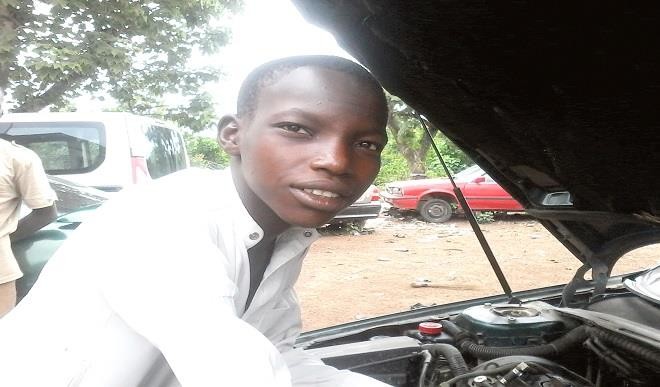
It doesn’t appear like the sun is hot when these kids breeze into the open air workshop in Mabushi, Abuja, most of them just after school. Little Abdulsalam Muhammad is eight, yet he removes and fixes car tyres, kick-starters and batteries, and works on exhaust systems. One of several child apprentices at a mechanic workshop in Mabushi, the Primary Four pupil – who attends Mabushi Primary School, Abuja – always makes for his place of work after the school bell rings its last for the day.
Muhammad started learning how to work automobiles four months ago and has learnt fast. Nevertheless, school work is always on his mind. He comes with his books to the workshop, and when there is less work, reads them. In the previous term, he took the fourth position in class. This is not a random effort. He has a dream. “I want to be a soldier who repairs armoured vehicles used to fight wars,” he says.
Muhammad is among the youngest, but he is not the only child at the workshop. Shamsudeen Iliya, 11, has been learning for a few months also. Among other things, he knows how to handle vehicle break pad-related problems and has experience on particular car models, including Peugeot 406 and Golf. Iliya’s parents were unable to fund his education, so he dropped out of school while in Primary Three. Although he enjoys what he is doing at the moment, he still holds unto his dream of being a mechanical engineer.
Umar Muhammad, 12,a Primary Six pupil, is little Abdul Abdulsalam Muhammad’s elder brother. Aside others, his knack is for handling vehicle shafts. A daunting task it is, but he says he’s all for it. The sky is the limit he insists and so he holds on to his passion of becoming a pilot.
Most of the boys have not worked at the workshop for a very long time. They all started less than a year ago. Musa Madaki has worked for three months and within this period learned to remove shafts, tyres, shock absorbers, top gasket cylinder, as well as fix them back. “I want to remain a mechanic,” Madaki says, adding that his parents approved his attachment to the workshop and in fact were responsible for him being there. “They handed me over to my boss themselves.” But, he still goes to school and is presently in Primary One.
Most of the children at the mechanic workshop attend school within Mabushi, including Abdulsalam, 15, who is in Primary Two at Mabushi Junior Secondary School. He loves science subjects and has already made up his mind to become a scientist in future.
While everyone else is learning conventional mechanic skills, Ibrahim Adamu has shown he has a gift for electrical works. A Primary Two pupil whose favourite subject is Mathematics, he is presently perfecting the skill of working vehicle engine fans,belts, loosening the stirring wheel, as well as repairing headlights. He is yet to decide what he wants to be in future, however, he is good with numbers.
Why did the workshop decide to take on many children? Ahmed Umar, a thirtyish man, directly oversees their training and encourages the children to get a formal education.The apprentices are allowed to specialise, with some of the children trained to handle a particular model under experts.
“I am a Peugeot specialist and I have about five apprentices under me,” Umar says.
Umar personally ensured some of the children were enrolled in school. Among them are a few relatives of his. “Life isn’t that smooth nowadays. These children need to acquire skills on the side aside formal education that will help them in the future. If after they get a degree and can’t find white collar jobs, they can rely on what they have acquired in the past.
But it’s not all smooth sailing for Umar. Some of the challenges come from the children’s parents. “It’s a case of them not encouraging the children to be punctual at the workshop. So we have to enforce that,” Umar explains, adding that, even after they return from school, they sometimes play around instead of running down to the workshop to catch up with work.
Then there’s the issue of finance. Umar points out that some of the children who are not being taken care of by their parents hawk minor items on the streets to make little cash, leaving the workshop, a place they can acquire a lifelong skill that will help in the future.
“Actually, there’s supposed to be a fee for their training, but when you consider their parent’s condition and the relationship we have built, i just overlook those aspects, because I want to assist the children,” Umar adds.
Because the mechanic workshop is not an organised company, there isn’t a laid down procedure for training the children. However, there are basic principles they adhere to. “For example, if a child is working for you as an apprentice, you cannot just give him someone’s car to work on,” Umar says. Instead, the child is given small assignments, such as putting a wedge against the car tyres. In this way, the boy participates in the process of working the vehicle by observing what his master does step-by-step. “With time, he will start removing tyres himself, or put down a jack and all that, and later improve more in what he has learnt from you.”
How fast the boys learn under a master is relative. A sharp and dedicated apprentice could learn between four to five years and even start his own business. But for some, it takes a much longer period to be grounded.
At the moment, Umar has three apprentices, between the ages of eighteen and twenty, who have trained under him for about nine years. “So, I am almost getting there,” he says.

 Join Daily Trust WhatsApp Community For Quick Access To News and Happenings Around You.
Join Daily Trust WhatsApp Community For Quick Access To News and Happenings Around You.


